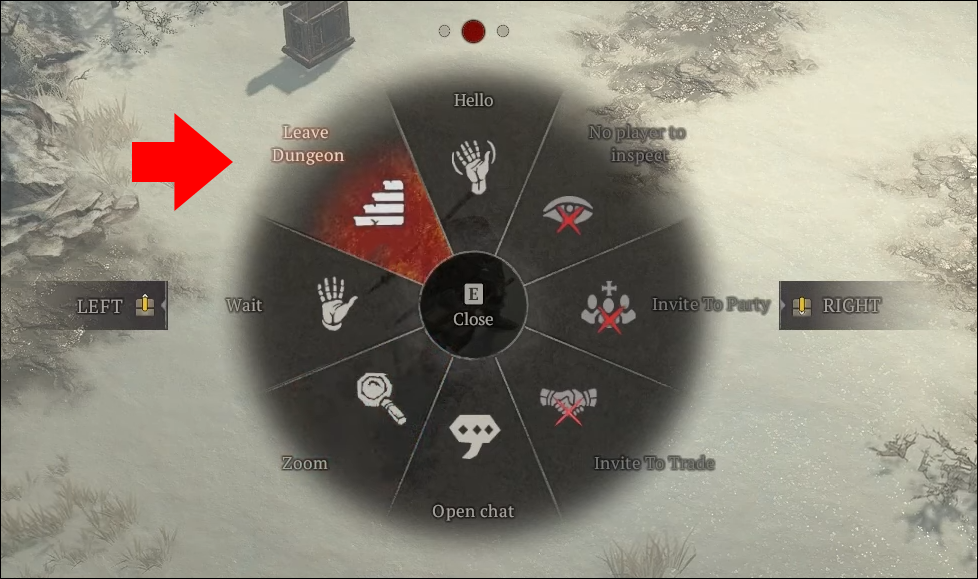Dungeons play a pivotal role in “Diablo 4.” Players looking for an easy way to boost their experience points (XP) can keep resetting their dungeons to achieve this goal. It is also helpful in farming more Gold and loot. Resetting dungeons allows you to eliminate all enemies in a specific area multiple times before advancing in the game.
Read on to learn how to reset dungeons in “Diablo 4.”
Resetting Dungeons in Diablo 4
It’s recommended that you first complete a dungeon before resetting it. There are three types of dungeons in “Diablo 4”: Campaign, Normal, and Nightmare. However, you can only reset Normal and Nightmare dungeons.
If you’ve been wondering how to reset the dungeon mechanics, you’ve come to the right place. Here’s how you can achieve this task in solo play:
- Exit the dungeon.

- Open your map.

- The missions you are currently pursuing will be displayed in the journal. Scroll down to locate the “Reset Dungeons” option.

- PC users can click on the button directly. Xbox users should long-press the “X” key, while PS5 users can just hit the “Touch” button and choose “Reset Dungeons.”
- Click “Accept” once the warning message pops up.

- Return to the dungeon, and everything will have spawned for you to loot and farm again.
Be aware that you need to have exited the dungeon to reset it. This method is also not recommended for Nightmare dungeons unless you’re okay with them reverting to regular dungeons.
Alternatively, you can:
- Hit the “M” key on your PC, the “Touch” button for PlayStation users, and the “View” control for Xbox users to display your world map.

- Select the “Reset Dungeons” option.

- A cautionary alert will be displayed, requiring you to confirm whether you want to reset all dungeons, including Nightmare.

- Choosing “Accept” will restore all dungeons except those in the Campaign category.

Be aware that dungeons typically act as the enemy’s fort, and you need to equip yourself with the best armor to survive and ensure your health is at optimum level. “Diablo 4” allows you to reset this feature as often as desired.
If you want to make the most use out of dungeons in “Diablo 4,” it’s recommended that once you find one you like, take time to farm enough XP, loot, and Gold before moving to the next. This will make your farming more efficient. You can exit the dungeons via its entrance or teleportation.
Resetting the Dungeons by Leaving the Game
This method will allow you to reset applicable dungeons for solo and online play.
- Exit the dungeon and wait for a minute outside the area.

- Leave the game and return to the character select menu.

- All the enemies and items to be farmed will have spawned back once you return to the game.
Players who use this method must ensure that no active portals remain within the dungeon before they exit. You won’t be able to farm the dungeon again if you leave an open portal inside. There’s also a possibility of losing your elixir effects when using this method.
Instant Reset for Group Play Dungeons
You can complete “Diablo 4” alone or as a group. Yet, it’s easier to take down tough bosses in a dungeon when in a group setting. Here’s how you can reset dungeons in group play:
- The party leaders should go to the “Social” menu and exit the dungeon.

- Once the leader leaves, all party members will be removed from the group.

- Wait at least five minutes for the dungeon to refresh.
- Request another player to send out an invite to other party members.

- Re-enter the reset dungeon and begin farming again.
Restoring a Partially Completed Dungeon
This can be helpful for groups or individuals who have started the dungeon on the wrong foot, feel overwhelmed by the enemies, or aren’t a fan of the dungeon layout. Here’s how you can restore a partially completed dungeon:
- Leave the dungeon (along with your party members).

- Wait at least 150 seconds.
- Re-enter the dungeon, and all materials will have respawned.
Dungeon Reset Trick
Remember, you can always engage in the game’s numerous side content while waiting for the dungeon to reset. Ensuring your inventory is empty before initiating a dungeon run is best. This enhances your efficiency because you don’t have to keep returning to town to trade your inventory items. Your items can also keep falling on the ground, which is likely to make some quests more difficult for you to complete.
FAQs
Can you reset a dungeon as a group in Diablo 4?
Yes. Your party leader can leave the group, and all party members will automatically be removed. Players can join the leader’s new group once the dungeon has been reset.
How long does it take you to reset a dungeon in Diablo 4?
Resetting a dungeon can take approximately five minutes to complete.
What is the best dungeon to reset in Diablo 4?
The Guulrahn Canals is ideal because it contains fewer enemies and fewer challenges to complete.
Amass Loot to Your Heart’s Content
While there are many locations where you can collect precious material, dungeons are one of the best loot sources in the “Diablo” series. If you want to stock up on Sanctuary’s gems, resetting dungeons is a smart choice.
Even though it’s bound to slow down your game progression, repeating the same dungeon can earn you vital XP and rewards that can make your exploration journey in “Diablo 4” easier. It does all this while ensuring you don’t lose your progress in the game.
Remember, each dungeon holds unique rewards and gameplay, so don’t hesitate to explore all of them as you advance through the game.
Have you ever tried resetting a dungeon in “Diablo 4”? Which type of dungeon have you been able to repeat so far? Let us know in the comments section below.
Disclaimer: Some pages on this site may include an affiliate link. This does not effect our editorial in any way.


















